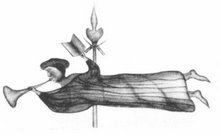Svithing Sharing Time
.
Today I and my coteacher and a bunch of seven-year-olds are doing
Sharing Time. What follows is the outline we will be working from. Copout? Maybe. Just use your imagination.
--------
.
Gift: Book of Mormon
President Ezra Taft Benson: “This is a gift of greater value to mankind than even the many wonderful advances we have seen in modern medicine. It is of greater worth to mankind than the development of flight or space travel” (Ensign, Nov. 1986, p. 4).
What is it?
(open it)
What is it?
What is its full name?
Who is it about?
-----
So the Book of Mormon testifies of Jesus Christ. Let's see how well it does its job.
(reveal jar)
What is all this candy?
Well, Alma said this: "Now, we will compare the word unto a seed. Now, if ye give place, that a seed may be planted in your heart, behold, if it be a true seed, or a good seed, if ye do not cast it out by your unbelief, that ye will resist the Spirit of the Lord, behold, it will begin to swell within your breasts; and when you feel these swelling motions, ye will begin to say within yourselves—It must needs be that this is a good seed, or that the word is good, for it beginneth to enlarge my soul; yea, it beginneth to enlighten my understanding, yea, it beginneth to be delicious to me."
As we get a testimony of Jesus, Alma says it is delicious. So we're going to pretend that these candies are delicious seeds and that each candy represents one time that Jesus is mentioned in the Book of Mormon.
How many seeds do you think there are? How many times is Jesus referenced in the Book of Mormon?
(answers)
Okay, keep thinking about that because we're going to come back to it.
-----
We have here today (#) of the many, many prophets who, in the Book of Mormon, prophesied of Christ.
They are going to share with us what they taught about Jesus and we're going to figure out who they are.
Nephi: "For according to the words of the prophets, the Messiah cometh in six hundred years from the time that my father left Jerusalem; and according to the words of the prophets, and also the word of the angel of God, his name shall be Jesus Christ, the Son of God."
2 Nephi 25:19
King Benjamin: "For behold, the time cometh, and is not far distant, that with power, the Lord Omnipotent who reigneth, who was, and is from all eternity to all eternity, shall come down from heaven among the children of men, and shall dwell in a tabernacle of clay, and shall go forth amongst men, working mighty miracles, such as healing the sick, raising the dead, causing the lame to walk, the blind to receive their sight, and the deaf to hear, and curing all manner of diseases."
Mosiah 3:5
Abinadi: "I would that ye should understand that God himself shall come down among the children of men, and shall redeem his people."
Mosiah 15:1
Alma the Younger: "And behold, he shall be born of Mary, at Jerusalem which is the land of our forefathers, she being a virgin, a precious and chosen vessel, who shall be overshadowed and conceive by the power of the Holy Ghost, and bring forth a son, yea, even the Son of God."
Alma 7:10
Samuel the Lamanite: "Behold, I give unto you a sign; for five years more cometh, and behold, then cometh the Son of God to redeem all those who shall believe on his name."
Helaman 14:2
Isaiah: "For unto us a child is born, unto us a son is given; and the government shall be upon his shoulder; and his name shall be called, Wonderful, Counselor, The Mighty God, The Everlasting Father, The Prince of Peace."
2 Nephi 19:6
("Hello, Hello" for Nephi, Benjamin, Abinadi, Alma, Samuel and Isaiah.)
-----
Okay, between them, our six prophets mentioned Jesus 17 times! In just six verses!
Nephi said he would be called "Jesus Christ, the Son of God."
Isaiah said he would be called "Wonderful, Counselor, The Mighty God, The Everlasting Father, The Prince of Peace."
What are some other things Jesus is called?
(Savior, Redeemer, Creator, Elder Brother....take all they say and slip in a few more)
Why does do we call Jesus all these different names?
(take answers and discuss some of the others on the board)
Jesus is important for all the reasons we've mentioned--even when we talk about him this much, there is still more to learn. (refer to jar) This is why the Book of Mormon mentions Jesus so many times.
If each one of these candies is one mention of Jesus, then we have talked about Jesus about 3,875 times.
And that's why the Book of Mormon is so important--it really is Another Testament of Jesus Christ, and there is no better way to learn about him than to read the book that mentions him all these times.
Mormon, who put the book together, wrote, "I write unto you . . . that ye may believe the gospel of Jesus Christ . . . ."
Mormon thought that every story he put into the Book of Mormon would help us understand the gospel better. Our prophets who spoke to us earlier are now going to tell us a short version of their favorite Book of Mormon story and then we'll talk about how it teaches us about Jesus.
(those who will tell their favorite story, bear testimony)
(closing testimony of Book of Mormon as testament of Jesus Christ)
---------
this svithe on thmusings
last week's svithe





